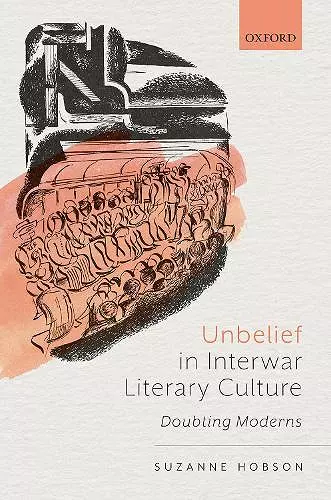Unbelief in Interwar Literary Culture
Doubting Moderns
Format:Hardback
Publisher:Oxford University Press
Published:1st Feb '22
Currently unavailable, and unfortunately no date known when it will be back

This volume offers a new account of the relationship between literary and secularist scenes of writing in interwar Britain. Organized secularism has sometimes been seen as a phenomenon that lived and died with the nineteenth century. But associations such as the National Secular Society and the Rationalist Press Association survived into the twentieth and found new purpose in the promotion and publishing of serious literature. This book assembles a group of literary figures whose work was recommended as being of particular interest to the unbelieving readership targeted by these organisations. Some, including Vernon Lee, H.G. Wells, Naomi Mitchison, and K.S. Bhat, were members or friends of the R.P.A.; others, such as Mary Butts, were sceptical but nonetheless registered its importance in their work; a third group, including D.H. Lawrence and George Moore, wrote in ways seen as sympathetic to the Rationalist cause. All of these writers produced fiction that was experimental in form and, though few of them could be described as modernist, they shared with modernist writers a will to innovate. This book explores how Rationalist ideas were adapted and transformed by these experiments, focusing in particular on the modifications required to accommodate the strong mode of unbelief associated with British secularism to the notional mode of belief usually solicited by fiction. Whereas modernism is often understood as the literature for a secular age, Unbelief in Interwar Literary Culture looks elsewhere to find a literature that draws more directly on secularism for its aesthetics and its ethics.
The book wonderfully portrays the complex ways in which arguments for and against unbelief-as well as modern and anti-modern elements-often interacted even within the works of the same author...Hobson's study of the doubting moderns-and of the doubts about modernity-provides a rich, multi-layered model that students and scholars will undoubtedly benefit from following. * Elad Carmel, Modern Theology *
Hobson demonstrates the manifold ways in which unbelief operates in modernist literary production...Unbelief is a detailed, informed, and innovative account of rational doubt and abiding hope in the interwar period. * Allan Hepburn, Women: A Cultural Review *
Doubting Moderns is a welcome addition to recent scholarship on modernism and religion, a field shaped by Hobson's earlier monograph Angels of Modernism: Religion, Culture, Aesthetics 1910-1960 (2011). By means of a careful study of Rationalist intellectual networks, Hobson broadens our understanding of religious (and irreligious) debate in the first half of the twentieth century, offering insightful readings of a range of often neglected experimental texts. Her sensitive consideration of how modernist literature has shaped our secular age ensures that this study provides insights that will be welcomed by scholars working in the interdisciplinary field of literature and religion, post-secular studies, and twentieth-century religious history. * Jamie Callison, Literature and History *
It mostly goes without saying that modernism was, by definition, an era of religious doubt and disillusionment... But in this fascinating new book by Suzanne Hobson of Queen Mary University of London, a different sense of the era emerges, one where committed secularism could invite critical sanctions and where open unbelief often met with polite silence from literary modernists. * Cecilia Konchar-Farr, Reception *
ISBN: 9780192846471
Dimensions: 240mm x 160mm x 23mm
Weight: 512g
250 pages